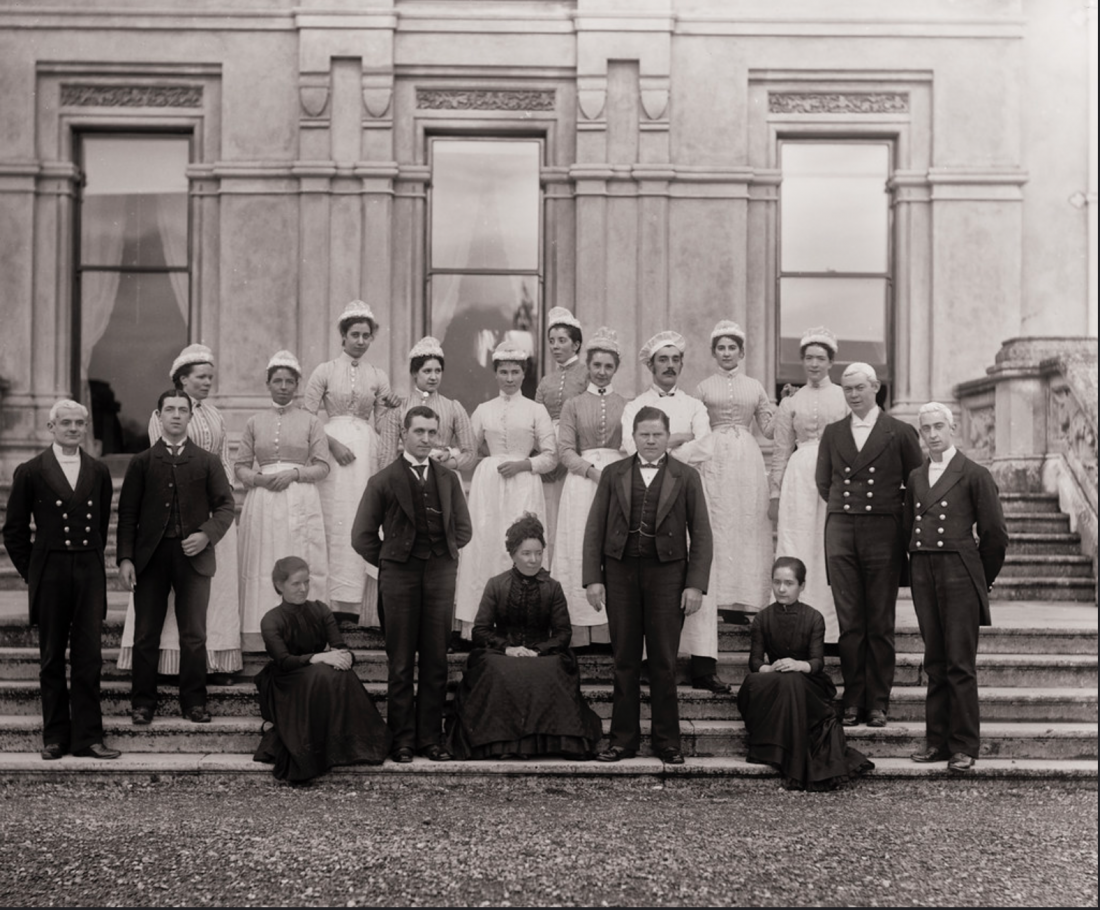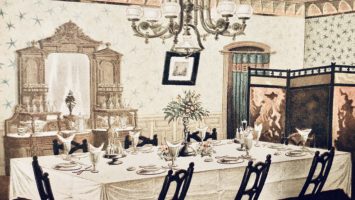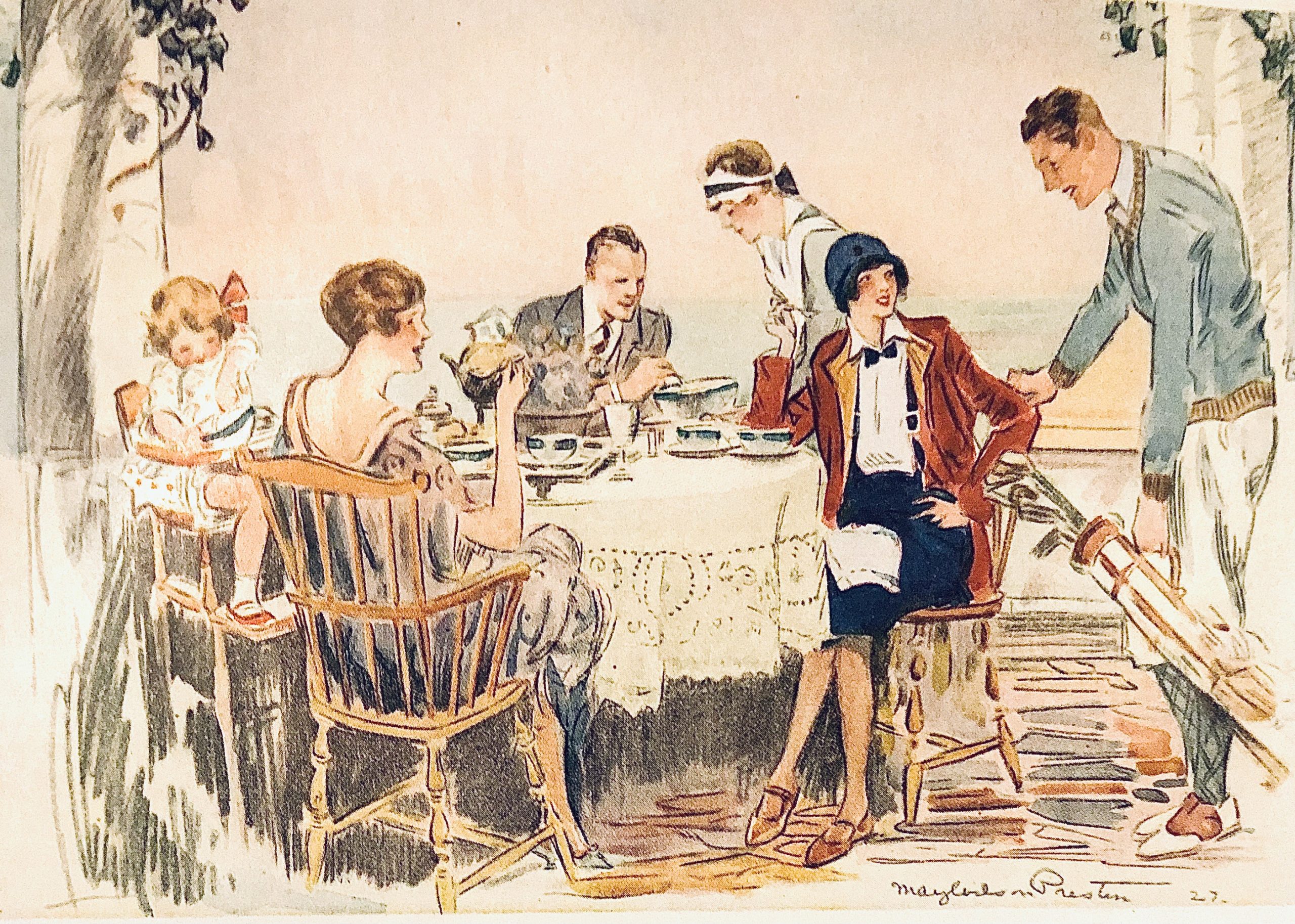When you watch Downton Abbey or any other period television program, you don’t begin to get the full picture of how much staff ran a stately home at the height of the Victorian and Edwardian periods. This is because television shows and films don’t have the time to show you every single person who would have worked in a grand home, nor do they have the budget to hire all the actors that would be needed to show a real stately home’s staff.
Staff could outnumber the members of a household fifty to one if you were very wealthy. Keep in mind, they all wouldn’t have all been serving the family directly. A country home made money through rents, grew and manufactured the food needed to sustain its’ inhabitants. This included produce, dairy, meat, grains and even beer and alcohol. A country estate was like a small, self-sustaining country.
Within the estate, staff had its’ own distinct hierarchy, with upper staff, lower staff and senior staff. Upper staff were at the top and were waited on by lower staff. Senior staff were under the upper staff, but could expect to be waited on by the lower staff. Lower staff were at the bottom, but even they had a hierarchy within their own ranks. In a very large house these staff groups might even eat separately from one another.
Here is a pretty exhaustive list of who you might find in a grand house. The number of positions was so great that I had to break it up in several parts, but keep in mind the size and number of staff varied wildly from house to house. Staff would have been tailored to a particular owner’s needs. A young couple who entertained often and lavishly, would have different needs from an older couple with many children, and who were the only wealthy family for miles.
I have also made these very slim overviews of the duties of each job, culled from multiple sources. Each house was different so the duties of each house could vary widely. I hope to post a historical overview of each job with a more extensive look at each position’s changing duties over time as according to etiquette guides, at a later date.
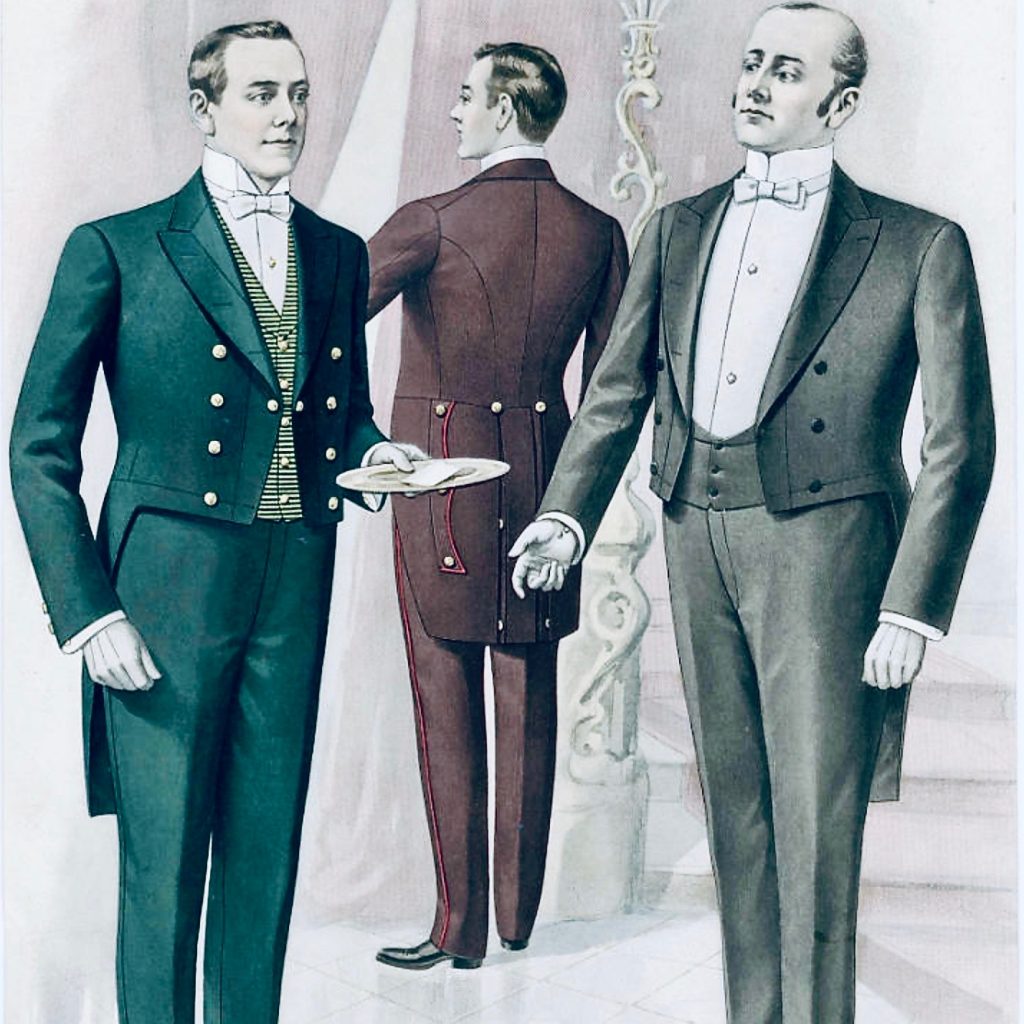
The Men
The Butler
The Butler was in charge of the front of the house. He was in charge of the male servants, the silver and the wine. This included wrangling the footmen, under butler, chauffer and scullery boys. Depending on the size of the house, the butler waited on the family at meal times and made sure the table was set with precision. He also decanted the wines and controlled the use of expensive liquor. Some butlers only served the wine while overseeing the footmen when the family dined. Butlers were responsible for the silver, which in a smaller house might mean that they would have to polish it themselves. More often, this was delegated to the under butler, (though while still keeping a watchful eye).
The butler might also kept the servants away from the family of the house, serving as an intermediary between those worlds when dealing with the mundane tasks of the everyday. In a truly grand house, this was a duty performed by the House Steward. In a small house the Butler assumed many of the House Steward’s responsibilities.
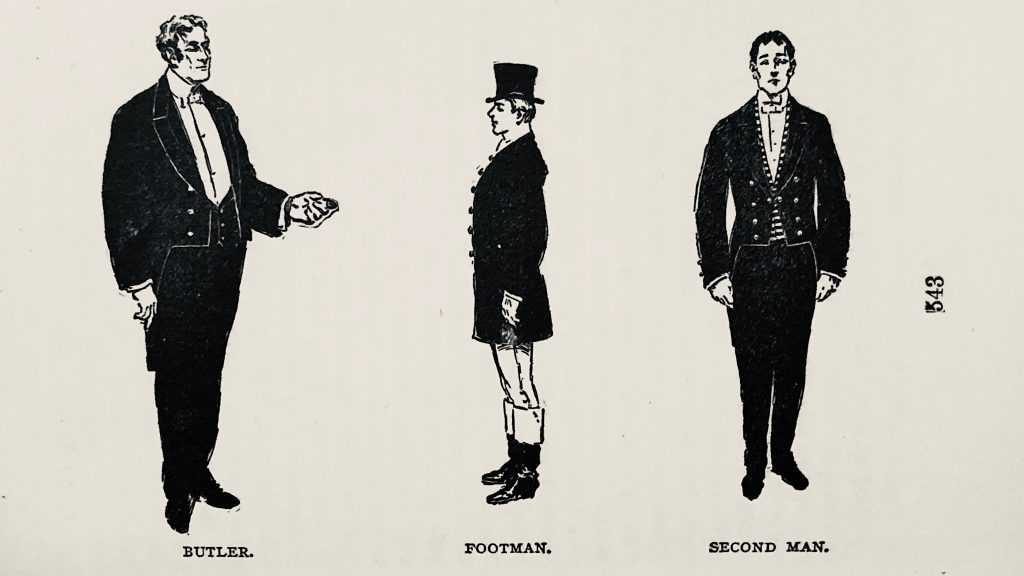
The Under Butler
The Under Butler, (also known as the Second Man) was second in command to the Butler. He is technically the lead footman in a household with many footmen. This man would have likely come up through the ranks of service to finally train under the Butler. He was likely to succeed the Butler on his retirement or be lured away to another grand home. The under butler wore a livery like the footmen until the Edwardian period when he might wear a suit similar to the butler, but with a distinctly different vest.
The Groom of the Chambers
Groom of the Chambers were found in the grandest of houses. His only duties were to announce company, answer bells, see that the receiving rooms were in proper order and were stocked fully with pens, paper and ink. He would assist in decorating the rooms with flowers, making sure candles were in their proper places and lit when needed to be. He organized the card tables for entertainments, supplied them with playing cards and tallies. He made sure the billiards table was clean and mended and ready with balls and cues, etc. He would also have an extensive knowledge of games rules and could be consulted when needed.
The Groom of the Chambers also kept a book showing any invitations sent to the household. This was important not only for making sure engagements were kept, but who should be invited in kind to balls and dinners. This book later served as a household record. He was also responsible for sending his household’s invitations, maintaining calling cards for the family and addresses for all those who were socialized with. He might also maintain books which contained the members of house parties, their preferences and staff. The groom of the chambers was expected to know the peerage and who outranked whom. He was supposed to be slightly above most of the staff as he was entitled to give orders and relay commands from the family, but was considered as an assistant to the butler and could be asked to wait at table when needed. Good looks were considered an essential quality of the Groom of the Chambers. On rare occasions a Groom of the Chambers could be asked to round out the numbers for a game.
Where there is no Groom of the Chambers, footmen would carry out many of these duties.
Valet/Major Domo
The valet keeps a man of the house in fine form and is responsible for making sure his life runs smoothly. Valets were generally hired by a single man or an elderly man. Married men with Valets were not actually commonplace, especially in the US. In a very wealthy British house where a husband and wife slept in separate bedrooms, valets were slightly more common. In a smaller house the butler might act as the valet for a gentleman.
The valet brushes his gentleman’s clothes, maintains his wardrobe, makes sure everything is clean and repaired. A valet might tidy his gentleman’s room. He cleans his gentleman’s shoes, puts out his clothes and assists in dressing him, also packing and unpacking his clothes when traveling. The Valet always travels with his gentleman, often buying the tickets and making all the reservations. He will even shave him when necessary. Valets also loads guns when shooting, and can carry the clubs on the golf course when no caddy is available. He stands behind his gentleman’s chair at dinner, waits at his breakfast and luncheon. A valet to an elderly gentleman attends to his health needs also, and may sleep in the same room. He does not wear livery. If you’ve ever seen Jeeves and Wooster, then you know of what we speak.
The valet has somewhat shifted now-a-days into the Major Domo, which is a cross between a butler and a valet. He no longer generally shaves the man of the house, but he may be asked to plan a dinner party, arrange the life of a gentleman or woman, run multiple homes, and more.
Quick note: Valet rhymes with pallet.
Footmen
The footmen were responsible for all the general male work around the house, including carrying luggage and picnic baskets. Often, it was the footman who answered the front door to callers and the back door to tradesmen. Below stairs duties included polishing the knives. They also took care of calling cards, carried trays of tea and served at the butler’s pleasure. Serving at table and sometimes arranging how the table was laid. Footmen might run errands and could also be press ganged into chaperoning ladies of the house on shopping trips to carry packages. Footmen wore very lovely outfits and generally stood around looking handsome. Taller footmen were paid more than shorter footmen and they were hired for their general attractiveness. First Footmen were in line to be under butler. With no under butler, a well trained first footman could directly replace a butler.
The first footman’s job was different from the second footmen. These little gradations in duties gave prestige to each step up the chain of command. The first footman would serve the meat at a dinner, while the second footman might serve the sauce. These distinctions might seem trivial to us now, but they meant as much a getting a plum account in an office does today.
Not just required to be tall, handsome and represent the status and wealth of the household, footmen were tipped by guests of the house and given gifts by the lady of the house. Second Footmen were essentially first footmen in training. Great lengths were gone to to see that the second footmen were similar in height and coloring. Like nice vases or table lamps, they were meant to be a matched set. The least of the footmen would open doors, wait at table when necessary, assist the ladies and gentlemen of the house in any tasks they might have, and be general handsome dogs-bodies. Now if this all sounds a bit superfluous, well you’re right. Footmen were not necessary for the running of a house and so were only hired at the wealthiest of houses. This does not mean that they did not work hard. Everyone in a large house earned their keep and a footman would not have lasted long if they had swanned around, trying to get by on just their good looks.
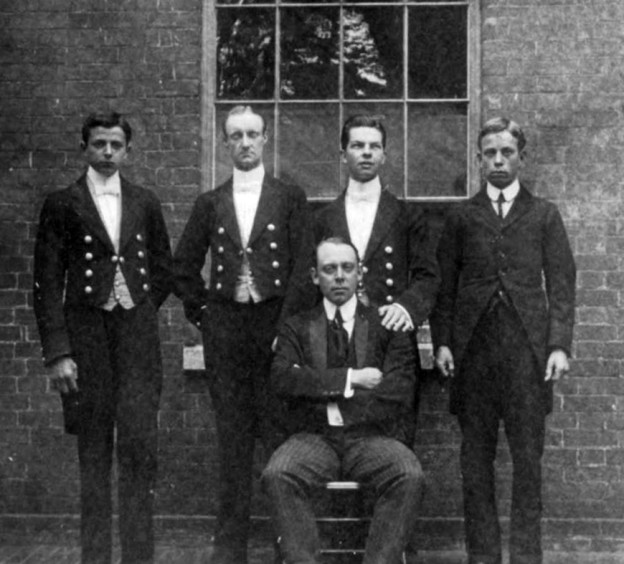

Page or Tea Boy
The youngest of what could be classified as a footman was the Page or Tea Boy. He was essentially a second footman in training. Usually only 10-16, these boys might wait on the ladies at tea as there was very little for them to do but carry in small cake baskets and generally look cute.
“The special innovation for the benefit of women are two drawing-room pages. These are small, well-trained little boys in buttons, livery or done up in slippers, white linen and turbans, who at intervals of fifteen minutes carry about among the callers large lacquer trays, on which are spread violets and rose leaves, crystallized and salted nuts with ginger. One is supposed to scoop up a few of the confections or nuts as the pages pass.”
Social Etiquette by Maud C. Cooke 1896
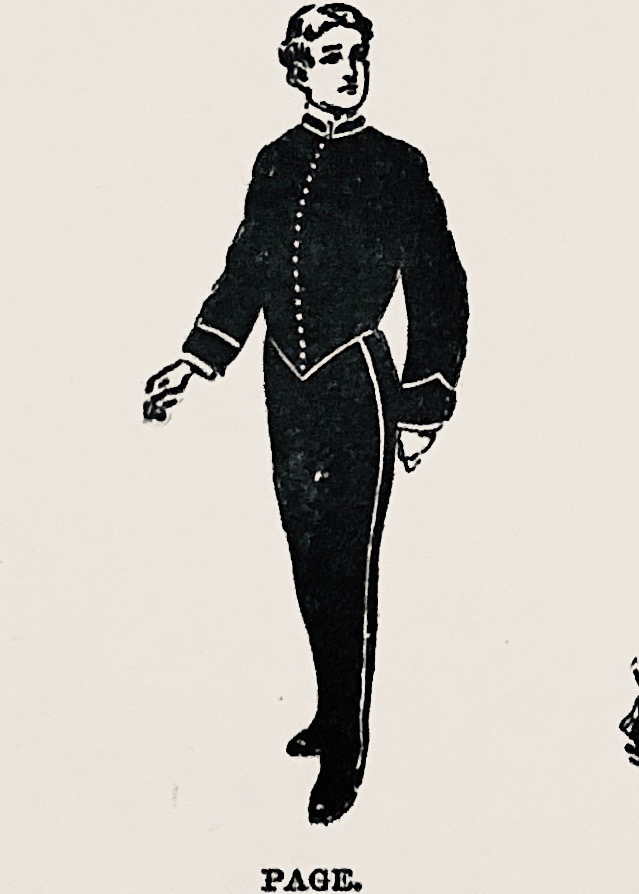
Steward’s Room Footman / Boy
Often a young boy who maintained the steward’s room and was his dogs-body. I’ve been looking for a more complete list of the duties of this child, but as yet cannot find a comprehensive one. Let me know if you have one!
Hall Boy / Boot Boy
Hall boys emptied chamber pots for the upper staff. They also cleaned the household’s boots. He would wait on the staff and therefore learn the trade of the valet or footman.
Oddmen
They weren’t actually odd, but they did do odd jobs. This was generally not a well-paid position, unless the odd man in question had special skills such as fixing clocks, restoration of the furniture, etc. Usually, these gents did general repairs, plumbing, kept the boilers running and fireplaces maintained.
Pantry Boys
Pantry boys maintained the pantry. They had to be trustworthy as they would be dealing with the expensive stores of the house. Sometimes they would be tasked to polish brass and lesser metals, which was good training for someday polishing the expensive sterling silver. They also had to deal with the eradication of vermin.
Lamp Boy
Literally a young boy whose whole job was to light and put out lamps. As crazy as it sounds to have a young boy with the sole job of lighting and damping lamps, in a house with hundreds of rooms, this is a huge task. Lamp boys would also trim wicks and keep the lamps in fine working order.
